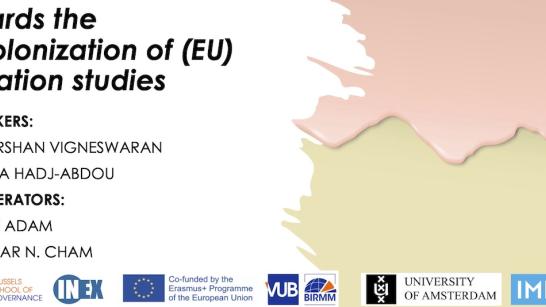Practical information

Calls for decolonizing the university have increased in the past years. The 2020 transnational Black Lives Matter movement has also reverberated these calls in the field of European migration studies. The current attention to decolonization reflects the gradual entry of formerly marginalized voices in public and academic debates. Because outside Europe, and in minority intellectual circles within Europe, debates on the decolonization of knowledge production, have been ongoing for decades. Decolonization is an intellectual endeavor that questions a Western knowledge production that obscures non-Western forms of knowledge, and it questions the European amnesia regarding the role of colonialism and race in understanding current social realities. In (EU) Migration studies, the role of race, racism and colonial histories have indeed been continuously and actively excluded as explanations of how and why the EU and European nation states reproduce hierarchized patterns of exclusion in migration and citizenship policies. However, can we fully understand current migration phenomena such as the so-called ‘European migration crisis of 2015’ and contemporary policy developments without this historical consciousness? In this seminar, our speakers will present their insights into what decolonization of (EU) migration studies might mean, why it is necessary and how researchers can contribute to this endeavor.
This event took place on Zoom, please find the recording below:
Speakers:
- Darshan Vigneswaran is the Co-Director of the Institute for Migration and Ethnic Studies and Associate Professor at the Department of Political Science, University of Amsterdam. In this webinar, he will highlight the way Euro- and Global North-centric thinking impairs our understanding of the politics of migration. He argues that decolonial thinking is often wrongly presented as a political project, which seeks a place for normative research in the social sciences. However, in the study of migration politics, decoloniality may be better seen as an appeal to better respect standard principles of social scientific reason and method. In this version, decolonial thought appears less as a political project than an appeal to both a) discern and unravel the deeply unequal, racialized and biased ways in which we have become accustomed to thinking about migration; and b) reconfigure the study of migration politics upon sound analytical concepts, representative research methods, and open and transparent discourse.
- Leila Hadj-Abdou is a Research Fellow at the Migration Policy Centre at the European University Institute and a University Assistant at the Department of Political Science at the University of Vienna. In this webinar, she will particularly focus on the practical challenges, pitfalls and opportunities of a decolonial approach. What do academics, and students ready to engage in decolonizing practices have to be aware of in order not to reproduce hierarchical forms of knowledge production and transfer? Leila will also touch upon the need to tackle socio-political divisions that have emerged in response to the decolonizing trend: How can we raise awareness for processes of racialization and establish self-reflexive practices in migration research without further fueling socio-political polarization within higher education and society more broadly?
Moderators:
- Ilke Adam is the Co-Director of the Brussels Interdisciplinary Research centre on Migration and Minorities (BIRMM) and Associate Professor of Political Science at Vrije Universiteit Brussel.
- Omar N. Cham is a PhD researcher in Political science at the Institute for European Studies, Vrije Universiteit Brussel and assistant coordinator of BIRMM-VUB
Co-Organizers:
BIRMM & Brussels School of Governance - Vrije Universiteit Brussel; The Politics of Inclusion & Exclusion (IN:EX) - University of Vienna; Institute for Migration and Ethnic Studies - University of Amsterdam.
With the support of the IMISCOE Anti-Racism Working Group